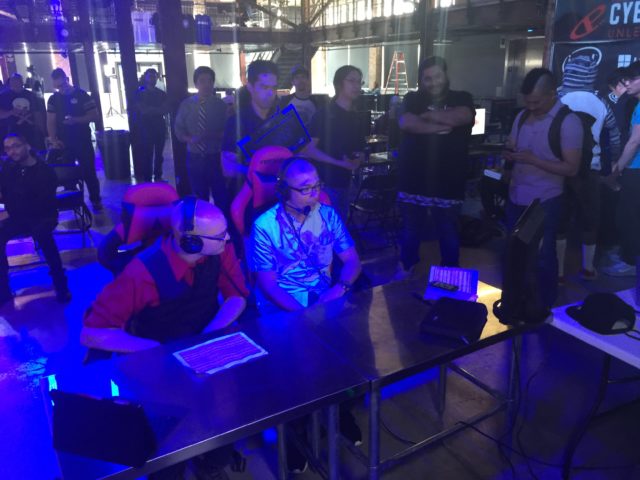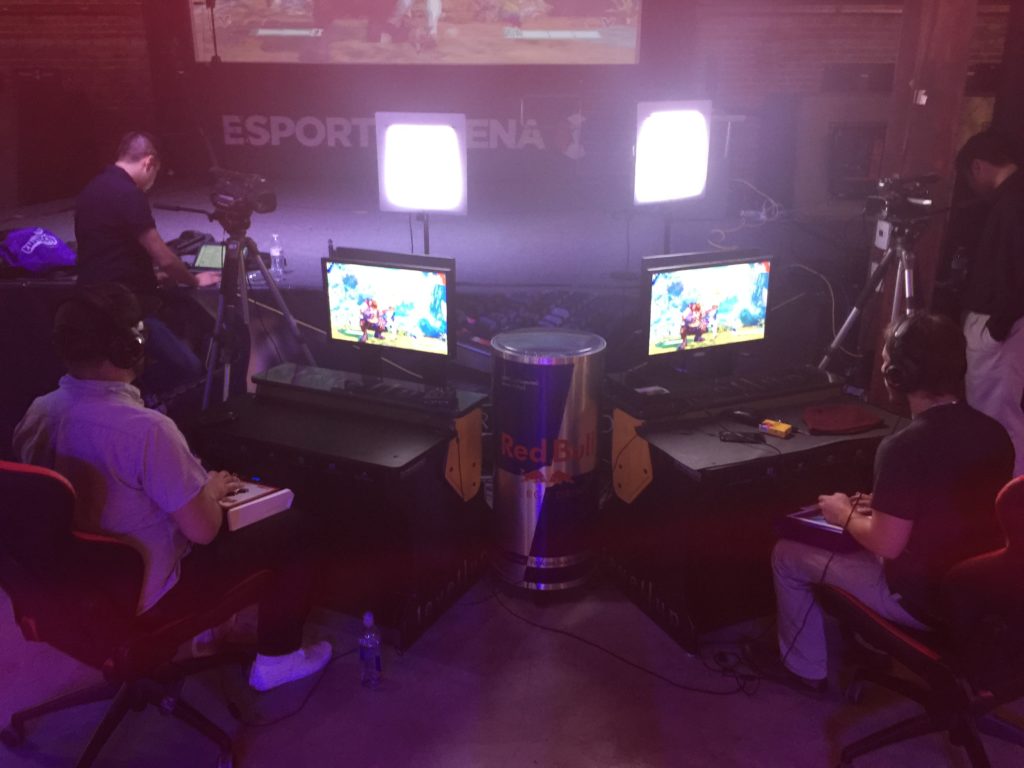As one of the first non-endemic brands to recognize the potential for eSports, Red Bull has full engrained their brand into the community—not just with events, but with content as well. Most recently, Red Bull has partnered with Capcom for Red Bull Proving Grounds, which is a monthly event that gives Steet Fighter V players the chance to compete in regional events across the country, culminating in a Proving Grounds finals event that will be livestreamed from Red Bull’s offices in Santa Monica, California on October 21-to-23.
Red Bull’s approach for Proving Grounds has been to work directly with existing tournament organizers who are themselves influencers in the fighting game community, or FGC, for short. [a]listdaily sat down with Carleton Curtis, the eSports program director at Red Bull, at a recent Proving Grounds event at the eSports Arena in Santa Ana, California to discuss how Red Bull is supporting the culture of eSports, and why it’s so important to them.
Can you tell me about Red Bull Proving grounds, and how it come about?
For Proving Grounds specifically, we happen to be huge fans of all the games within the FGC, first of all. It is sort of near and dear to our hearts as a team. Right now, we see a lot of building from the top when it comes to eSports. Essentially everybody is interested in the next million concurrencies on Twitch or the next $20 million prize pool, or the next stadium that was sold out with tens of thousands of people in it. Now that’s all really great stuff and is an important layer of eSports in our opinion, but we also believe there’s a lot of important layers beneath that and help support it even existing.
You can’t really have any of those spectacles without the community level and that’s really what events like Vanguard and Proving Grounds are supposed to represent and support. We’re entering different markets around the country—we started with six cities in North America in June and we’re reaching out within those cities to create something new that is Red Bull and trying to build a new Red Bull project. We’re identifying existing communities and existing tournament organizers and supporting them so they can level up because there’s really rich histories over decades when it comes to the FGC.
Larry Dixon in Atlanta, Big E in Philadelphia and Alex Valle here in LA at Vanguard—they all have really rich histories so why screw that up? Why start something else? Why not join forces with them and make what they do better? So what we’re trying to do is, not just giving them monetary support, but giving them boots on the ground, like the team you see here today even though it’s just a number of us. We have a ton of best practices being a massive events business at Red Bull and we have all the tools to provide them to do a better job with what they’re already working with because the thing is, these guys aren’t typically full-time. They’re not at that level yet in their business where they can quit their jobs and do this full-time. So we’re trying to eventually give them the means, so to speak. That’s the phrasing—Red Bull is trying to give people wings. We’re trying to give these guys wings to really follow their passions and make real businesses out of their local tournaments and also help them build the communities that are already there into bigger and bigger things.
How did the partnership with Capcom come about?
They’re a great partner of ours. We’ve worked with them for years now. This year we’re starting to see a lot more involvement from Red Bull. In April we had an event in Paris, called Kumite, which was an invitational. We invited the best Street Fighter pros from around the world to converge in a really unique event format in Paris. For us, Proving Grounds is basically a qualifying series across the year that ultimately will help bring the best players in each region, and surface them where they can compete in a finals format in the Red Bull studio in September. The top players from the regions all get flown to Santa Monica to compete for the title of Proving Grounds champion. We give them an all-expenses paid trip to the Capcom Pro Tour North American finals at Battlegrounds, which we’re hosting in Seattle in September, so all those things are interconnected.
Again, we’re just big fans of the game and also it was really good timing for support around Street Fighter this year. Street Fighter V finally launched after an eight-year hiatus from IV and it’s just a really good year to work with Capcom on this game, specifically. It has a big resurgence in popularity, the game itself is incredible—we all play it—and it made a lot of sense to work with them and connect—not just Kumite, but Proving Grounds with this Battlegrounds format. So now we’re a premier stop—basically the final stop—in Capcom’s tour when it comes to premier stops. Then everybody heads over to the Capcom Cup afterward.
What is the significance of having a dedicated eSports space?
We see the future of eSports, but we also really romanticize the past of gaming culture and eSports. One of the things I think is great for gaming and eSports is that online gaming became a thing a decade ago. Streaming became a massive thing in 2011 with Twitch. What that was able to do was to connect the world in a really meaningful and profound way, but one of the negative byproducts of that is you lost a lot of the local culture that makes eSports really cool and really great. Particularly with the FGC, which is based on arcade culture for decades and it is people getting together in close proximity and playing face-to-face like you and I are talking right now and that’s a really special thing.
You kind of lost the sort of NorCal vs. SoCal thing and the East vs. West, where those rivalries existed in really meaningful ways. With streaming and online play, it became like Korea versus the rest of the world, or Japan versus the other better players out in the world. Again that’s a really awesome thing for the growth of eSports, but I think one of the things we lost was that community and physical proximity with your friends and rivals in gaming. So the FGC specifically really represents that. That’s a big reason why we were attracted to it and frankly wanted to launch Proving Grounds with Street Fighter because of all those reasons.

What are your thoughts on eSports coming into more mainstream recognition?
I love it. It’s what I do for a living and I’m very excited and blessed to do this and have conversations like this with you. It’s a really amazing time for eSports right now. It’s also a very chaotic and sort of frantic time for eSports right now. I think if you ask anybody, whether they’re new to eSports or whether they’ve been in it for decades, how the landscape is going to look just three years from now or even three months from now, it is a very difficult prediction to make.
It’s just amazing to see the kinds of investments coming from all over the place: from celebrities like Mark Cuban, Shaq and Manchester City investing in FIFA players. We’re talking right now in eSports arena, a physical place that’s dedicated eSports. It’s an enormous space right now and it’s really great that it’s getting its attention now. It is sort of like a rising tide than a floats-all-boats thing, but at the same time you really want to be careful that you’re not blowing up a bubble and it’s kind of like, going back to what I was saying, these really glamorous glitzy prize pools and stadium-class events. That’s all great and it’s an important part of eSports—that’s what’s frankly bringing a lot of attention to the space.
Advertisers love the demos, advertisers love the numbers—but at the same time, if that bubble bursts, what’s left? It’s that community that helped build all of this and that’s why we’re here at Vanguard tonight. The community within any major game genre or game title will never go away. Those people will always come back to the Vanguards and the Proving Ground stops and even the tournaments that exist outside of Proving Grounds. That’s why we’re trying to invest in all levels of eSports at Red Bull. We just fundamentally believe that the right thing to do is build eSports from the bottom up versus the top down.
How do you feel an event like this supports Red Bull product marketing-wise?
There’s clearly a great fit for Red Bull as a product in eSports. It vitalizes mind and body and there’s various need states for it and the product functionality that Red Bull offers. You need sustained energy and sustained focus to compete across many hours of an event. We believe that it really services gamers in that way. As a program—our eSports Red Bull team—we’ve been around for five years and we’ve sponsored athletes for 10 [years] at this point, so our roots are really deep in the scene and the space.
We’re committed for the next 10 years and the next 10 years after that. We’re not going anywhere and that’s why we like to be a part of community-level events like this because everything grows from the community. A building like this grows from the community. The next player who becomes the next Nadeshot starts in the community, the next caster, the next tournament organizer—it all starts in places like this. That’s a huge reason why we’re here supporting that.
The [Red Bull] can is certainly a part of that experience, but not the only part of that experience. We’re not going to force anyone to drink a RedBull, we believe everything should come naturally and that includes drinking our product and receiving the benefits of that product.
What is your ultimate goal for these events? What do you hope people take away from them?
Whether it is a Proving Grounds event or a Battlegrounds event, or frankly, an event that Red Bull produces outside of eSports, our number one goal is to create the best experience that the audience can partake in and the athletes themselves. We want both of those parties to have a once-in-a-lifetime experience that they’ll always remember. That’s really what we believe the point should be when putting on an event.
It’s not, again, just to get a million viewers watching or 10 viewers watching. That doesn’t really matter. If those people in the audience and those players that are engaging in the games they’re playing—are having the times of their life—that’s most important to Red Bull. That’s frankly our number one goal. Then of course outside of that, we would love to see all of our tournament organizer partners do this for a living full-time and scale what they do, not just in their local communities and cities, but mushrooming across the country and the world. Ultimately that’s what we want to support these tournament organizers with.

